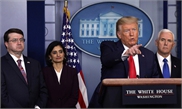https://youtu.be/sdre7SOd2hg
今天,中美正式摊牌!百年国运之战已经开始!
https://youtu.be/KKJ6em7g53o
 |
| Free to travel: The Wuhan lockdown was lifted on april 8 after 76 days of tough isolation measures. — Bloomberg |
The path ahead is filled with challenges for China, the magnitude of which could be frightening.
This economic giant of the East, now leading the global fight against Covid-19, is likely to continue to face a barrage of accusations – or even lies – that could prompt opportunistic and hostile countries to demand compensations to the tune of billions or even trillions from Beijing based on the current narratives.
In short, China – the first country to be hit by the coronavirus, will have to brace itself for another intense battle after defeating the invisible coronavirus with a huge cost and sacrifice. If the republic is not prepared for these future challenges, its strong manufacturing sector may suffer, its important position in the global supply chain and its economy will be derailed.
This is the post Covid-19 scenario painted by Chinese netizens on social media, as they warn their leaders to stop giving free aid or sell medical supplies cheap to “ungrateful and evil” countries.
The worries of the Chinese nationals are not unfounded. They stem from recent news flow and anti-China remarks made by the US and its allies.
In Washington, China faces criticism over the way it had handled the pandemic, lack of transparency and alleged delay in sharing crucial information with the world on the virus. US President Donald Trump, who labelled the coronavirus the “Chinese virus” last month, has often said Beijing should have acted faster to warn the world of the risk. He has even expressed doubt over Chinese data on infections and deaths. All these verbal assaults are hurled at China even as the US and its allies are receiving Chinese aid or made-in-China surgical masks, ventilators, Covid-19 test kits and protective gear. As its production of masks is fast and efficient, accounting for about 50% of the world’s output, countries short of supply now have to turn to China for this essential commodity.
 |
While Trump has stopped calling it the “Chinese virus”, US Secretary of State Mike Pompeo and other senior officials have stepped up their campaign against China, insisting on labelling Covid-19 as “Chinese virus” and “Wuhan virus”.
By using the label, they are insinuating that the virus had originated from Wuhan. And by extention, China should compensate the virus-hit countries whose economies have been derailed and social life disrupted.
One class action lawsuit against China has been filed in the Federal Court in the US seeking damages suffered from the Covid-19 pandemic. The stigmatisation of China by US continues unabated despite the release of more and more studies – including those from the US – indicating that the virus could have originated from the US.
China has become the scapegoat for the US and other countries for their failings. They have not taken speedy action to control the spread of the disease despite watching China suffer in January through to March.
What angers the Chinese most is that in some countries, China’s kindness and generosity in extending help is cast with suspicion. It is not reciprocated with gratitude.
Recently, the European Union’s foreign policy chief Josep Borrell called on the bloc to be ready for a “struggle for influence” with Beijing. Some EU ministers even insinuated that Chinese aid is aimed at undermining European unity, after Italy and Serbia thanked Beijing profusedly for its help.
In response to remarks by a French minister claiming Beijing is waging a global propaganda campaign, China’s Foreign Ministry spokesman Hua Chunying retorted: “Do they wish to see China standing by idly while witnessing other countries suffer from the severe pandemic and losing lives? Do they think they can do better than China in handling the disease?”
Hua took the opportunity to reiterate China’s belief that only international solidarity, cooperation and mutual respect can overcome the difficulties. Stating Beijing’s objective is to save lives and help the world end the pandemic, she added: “China will not forget the international community had given it valuable support and help at the most difficult time in the country’s fight against Covid-19. Beijing is willing to reciprocate the kindness of others.”
China has said it has extended help to more than 127 countries in their fight against coronavirus.
It has given free medical aid to the world’s least-developed nations, such as Laos, Myanmar, Bangladesh and some African countries. Together with its private sector led by Alibaba Foundation and Huawei, it has also donated free medical supplies to almost all Southeast Asian nations and Pakistan. In response to calls for help from the US and traditional American allies like Spain, France and Japan, China has acted without hesitation. However, after getting medical supplies from China, some countries showed their ugly side.
Spain’s action was shocking and crude. After receiving the first batch of supplies in late March, the Spanish government returned 9,000 “quick result” test kits to China because they were “sub-standard”.
The sensibility of the test was only 30%, against the 80% expected. China responded by conducting its own probe. It was discovered that the test kits Spain bought were from an unlicensed Chinese firm, and the test kits the Spanish government ordered from the Chinese government had not arrived. Currently, Spain is among the worst-hit countries in the pandemic that has engulfed the whole globe.
In Asia, Beijing came to the rescue of Japan – one of the earliest countries to donate medical supplies to China in late January. When the Princess Diamond cruise ship docked in Japan, China donated test kits to the National Institute of Infectious Diseases in Japan. In the West, China sent France, Germany, Britain and US the much-needed medical supplies.
Chinese presence is also felt in Iran, the Czech Republic, Ethiopia, Liberia, Serbia and India.
But not all news is depressing for the Chinese.
Beijing has been showered with praise and gratitude by countries desperate for help. Many Italians sang Chinese national anthem and hoisted Chinese national flag from their flats after Beijing sent more than 300 experienced doctors to Rome to share their expertise and experience.
In early March, Serbian President Aleksandar Vucic – who failed to get help from EU countries – said during a televised address: “European solidarity does not exist. I believe in my brother and friend Xi Jinping.”
Although China had admitted it was not perfect in its initial handling of Covid-19, the World Health Organisation (WHO) still praises Beijing’s response and for its appropriate strategies in battling the virus, which has claimed over 3,300 deaths in the country.
The crisis in China is largely over, while the rest of the world is still busy fighting the Covid-19 war. In recent days, the daily domestic infections in China have fallen to zero or near zero, although it is still dealing with imported cases.
On Wednesday, the 76-day lockdown on Wuhan was lifted with cheer and celebrations.
While China has often emphasized international solidarity and cooperation to end the pandemic, its leaders have indicated the country will face more challenges post Covid-19.
The concerns of its people on social media could be felt in the editorial of Global Times on April 6: “As a major country that was among the firsts to bring the novel coronavirus under control, China must prepare to face an extremely complicated situation.”
China believes the pandemic is unlikely to end quickly and knows this will impact the world order and trigger turmoil, according to the official media of China.
It said: “Nationalists and populists may have more room to fan the flames and China is likely to become the target of certain Western leaders to displace their peoples’ anger and disappointment. China may face much more serious risks in international politics.”
During a key leadership meeting on Wednesday, Xi warned that new challenges have emerged for China’s work resumption and economic/social development. In a statement released after the meeting, Xi called for “preparedness in mind and work” to cope with external environment changes and demanded other Chinese leaders to redouble efforts in economic and social development.
Lest others forget this: China Today is not the Old China during the Ching Dynasty.
By HO WAH FOON
Read more
Chinese donations to the Holy See shows unobstructed, beneficial channel: experts
The Holy See has thanked recent donations from China to the Vatican Pharmacy amid the global COVID-19 pandemic, which Chinese observers say shows communication channels between the two being unobstructed and beneficial.Blaming China for coronavirus isn't just dangerous. It misses ..
VOA trounced by Trump for impartial reporting on China
By blaming China, Trump is trying to duck responsibility for his failures. Casting blame on US media is part of the internal strategy of his administration. Unfortunately, this is not how the US will solve its problems.Southern California Chinese Americans donate much-needed supplies to U.S. hospitals, first responders
As COVID-19 cases skyrocket in Southern California in the Unites States, Chinese Americans who saw Chinese people undergo hardship during the outbreak in China are stepping up to help their American neighbors as well.Related posts:
People stand near the Yangtze River in the
city of Wuhan, on April 6. In recent weeks, officials have gradually
eased some of the lockdo...
https://www.bloomberg.com/graphics/2020-coronavirus-cases-world-map/
Zhong Nanshan https://youtu.be/2QVCe22Sqgw https://y...
Check the latest update:
https://www.bloomberg.com/graphics/2020-coronavirus-cases-world-map/
Mapping the Coronavirus Outbreak Across t...
https://youtu.be/bQKQQSSyo-YA Submariners
are likely unaware of the Covid-19 pandemic that’s wreaking havoc around
the world. Fre...
Viral diplomatic wars: Trump’s labelling of
Covid-19 as a ‘Chinese virus’ earlier this month has infuriated Beijing
and ethnic Chinese w...



https://youtu.be/uR_LfkGwBG8 As readers
will recall from the earlier article (above), Japanese and Taiwanese
epidemiologists and pharma...
https://youtu.be/Y_dU2RCqWs4 FORCED TO
SHUT DOWN WHEN VIRUSES LEAKED AUGUST 2019 US SOLDIERS WERE
INFECTED 300 HUNDRED CAM..
The hegemonic anxiety of America First













No comments:
Post a Comment